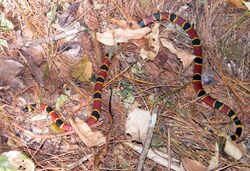Biology:Micrurus nigrocinctus
| Micrurus nigrocinctus | |
|---|---|

| |
| Scientific classification | |
| Script error: No such module "Taxobox ranks".: | Animalia |
| Script error: No such module "Taxobox ranks".: | Chordata |
| Script error: No such module "Taxobox ranks".: | Reptilia |
| Script error: No such module "Taxobox ranks".: | Squamata |
| Script error: No such module "Taxobox ranks".: | Serpentes |
| Script error: No such module "Taxobox ranks".: | Elapidae |
| Script error: No such module "Taxobox ranks".: | Micrurus |
| Script error: No such module "Taxobox ranks".: | <div style="display:inline" class="script error: no such module "taxobox ranks".">M. nigrocinctus |
| Binomial name | |
| Micrurus nigrocinctus (Girard, 1854)
| |
| Synonyms[2] | |
| |
Micrurus nigrocinctus, commonly known as the Central American coral snake, is a species of a highly venomous snake in the family Elapidae. The species is endemic to Latin America from southern Mexico, Central America, to north Colombia.[3] There are six recognized subspecies, including the nominate subspecies described here.[4]
Common names
Common names for M. nigrocinctus include Central American coral snake, and in Spanish: serpiente-coralillo centroamericana,[4] coral centroamericana, coralillo, gargantilla, salviara, limlim, babaspul, and coral macho.[3]
Description
The Central American coral snake is capable of growing to a total length (including tail) of 115 cm (45 in), but most are closer to 65 cm (26 in). It has smooth scales, a rounded head, and eyes with round pupils. Its color pattern can vary from two-colored to three-colored, with black, yellow and red banding.[3] The snout is black. Halfway the head, there is usually a yellow ring (in three-colored specimens) or a red ring (in bi-colored specimens). Color pattern on the body consists of often fairly broad red bands separated by much narrower sets of yellow-black-yellow bands. The numbers of black bands on the body may vary from 10 to 24, and an additional 3 to 8 on the tail.
Geographic range
Micrurus nigrocinctus ranges from southern Mexico through Central America (except Belize) to northwestern Colombia, and the western Caribbean.
Habitat
M. nigrocinctus is mainly found in lowland rain forest, lowland dry forest, thorn forest, lower montane wet (or moist) forest, and lower montane dry forest, usually at elevations up to 1,300 m (4,300 ft).[3]
Behavior
M. nigrocinctus is mainly a terrestrial snake that often dwells in burrows, leaf litter, or under logs. Like most coral snakes it is usually nocturnal, though it may also be active at dusk and dawn, and sometimes after rainfall. It feeds on other snakes, small lizards, amphibians, and invertebrates.[3] While usually not aggressive, it will bite when molested or restrained.[3]
Reproduction
M. nigrocinctus is oviparous.[2]
Venom
The Central American coral snake's venom contains a strong neurotoxin, causing neuromuscular dysfunction.[3] Its LD50 is 0.3 mg/kg (IV), 1.7 mg/kg (SC) and 0.4 mg/kg(IP), the venom yield is 8 mg.[5]
Subspecies
There are six (seven) recognized subspecies of Micrurus nigrocinctus:
- Micrurus nigrocinctus babaspul Roze, 1967
- Micrurus nigrocinctus coibensis Schmidt, 1936
- Micrurus nigrocinctus divaricatus (Hallowell, 1855)
- Micrurus nigrocinctus mosquitensis Schmidt, 1933 - accepted as species (Micrurus mosquitensis)[6]
- Micrurus nigrocinctus nigrocinctus (Girard, 1854)
- Micrurus nigrocinctus ovandoensis Schmidt & Smith 1943
- Micrurus nigrocinctus zunilensis Schmidt, 1932
Nota bene: A trinomial authority in parentheses indicates that the subspecies was originally described in a genus other than Micrurus.
References
- ↑ Chaves, G.; Lamar, W.; Solórzano, A.; Ortega, A.; Zamora, G.; Caicedo, J. (2015). "Micrurus nigrocinctus". IUCN Red List of Threatened Species 2015: e.T198387A115339884. doi:10.2305/IUCN.UK.2015-4.RLTS.T198387A2523534.en. https://www.iucnredlist.org/species/198387/115339884. Retrieved 25 August 2023.{{cite iucn}}: error: |doi= / |page= mismatch (help)
- ↑ 2.0 2.1 Species Micrurus nigrocinctus at The Reptile Database . www.reptile-database.org.
- ↑ 3.0 3.1 3.2 3.3 3.4 3.5 3.6 AFBMP. "Micrurus nigrocinctus ". AFBMP Living Hazards Database. AFBMP. http://www.afpmb.org/pubs/living_hazards/snakes.html#Micrurusnigrocinctus.
- ↑ 4.0 4.1 "Micrurus nigrocinctus ". Integrated Taxonomic Information System. https://www.itis.gov/servlet/SingleRpt/SingleRpt?search_topic=TSN&search_value=585951. Retrieved 5 August 2010.
- ↑ "LD50 and venom yields | snakedatabase.org". http://snakedatabase.org/pages/ld50.php.
- ↑ The Reptile Database: Micrurus mosquitensis. 2022-Dez-15)
Further reading
- Freiberg M (1982). Snakes of South America. Hong Kong: T.F.H. Publications. 189 pp. ISBN 0-87666-912-7. (Micrurus nigrocinctus, p. 116).
- Girard C (1854). "Abstract of a Report to Lieut. James M. Gilliss, U. S. N., upon the Reptiles collected during the U. S. N. Astronomical Expedition to Chili [sic]". Proc. Acad. Nat. Sci. Philadelphia 7: 226-227. (Elaps nigrocinctus, new species, p. 226).
Wikidata ☰ Q617477 entry
 |

